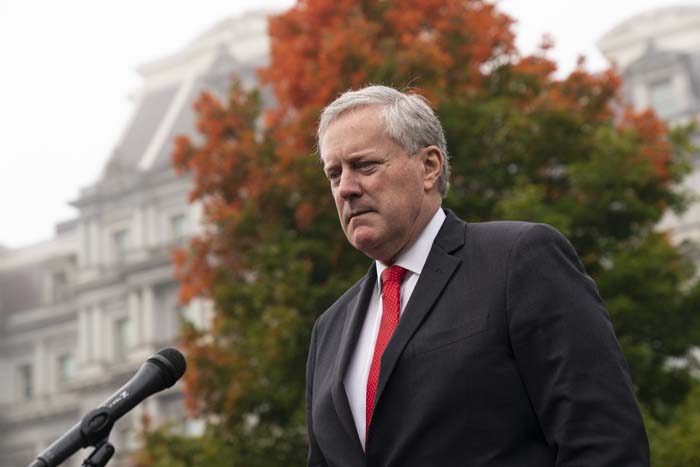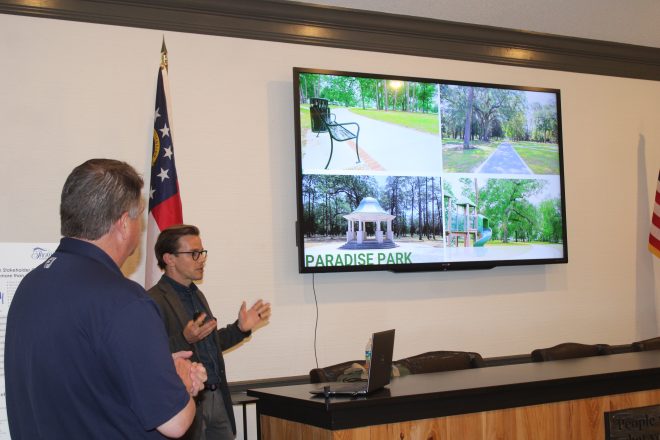Trump chief of staff Meadows says actions laid out in Georgia indictment were part of his job
Published 8:29 pm Monday, August 28, 2023

- ADDRESSING ALLEGATIONS: White House chief of staff Mark Meadows speaks with reporters at the White House, Wednesday, Oct. 21, 2020, in Washington. A federal judge in Atlanta is set to hear arguments Monday, Aug. 28, 2023, on whether Mark Meadows should be allowed to fight the Georgia indictment accusing him of participating in an illegal scheme to overturn the 2020 election in federal court rather than in a state court.
ATLANTA — Mark Meadows testified in court Monday that actions detailed in a sweeping indictment that accuses him of participating in an illegal conspiracy to overturn then-President Donald Trump’s 2020 election loss were all part of his job as White House chief of staff.
The extraordinary testimony — from a former top presidential aide who now faces charges alongside his old boss — came in the first courtroom skirmish in a case that’s likely to have many. Meadows’ claims were part of his argument that the case should be moved from a state court to federal court. U.S. District Judge Steve Jones did not immediately rule.
As Trump was consumed by claims of widespread election fraud in the weeks after his 2020 loss, Meadows said, it was difficult to focus on the things they needed to be doing to wind down the presidency. As a result, Meadows said, he took actions to determine whether the allegations were true, including actions prosecutors allege were improper.
Meadows said he didn’t believe he did anything that was “outside my scope as chief of staff.”
Fulton County District Attorney Fani Willis, who used Georgia’s racketeering law to bring the case, alleges that Trump, Meadows and 17 others participated in a wide-ranging conspiracy to try to keep the Republican president in power illegally even after his election loss to Democrat Joe Biden. Willis’ team argued that Meadows’ actions were political in nature and not performed as part of his official duties.
It’s just one of four criminal cases Trump is currently facing. In Washington on Monday, a judge overseeing a federal case over charges that Trump sought to illegally subvert the results of the 2020 election set a trial date for March 4, 2024, right in the heart of the presidential primary calendar.
During the Georgia hearing, Meadows attorney George J. Terwilliger III called his client to the stand and asked him about his duties as Trump’s chief of staff. The lawyer then walked him through the acts alleged in the indictment to ask if he had done those as part of his job. For most of the acts listed, Meadows said he had performed them as part of his official duties.
In the cross-examination, prosecutor Anna Cross ticked through the same acts to ask Meadows what federal policy was being advanced in each of them. He said repeatedly that the federal interest was in ensuring accurate and fair elections, but she accused him several times of not answering her question.
Meadows spent nearly four hours on the stand, sometimes struggling to remember details of the events that unfolded over about two months following the election. But he remained upbeat, indulging in self-deprecation with a quip about how he sometimes forgets to take out the trash, smiling frequently and laughing at the judge’s jokes.
Prosecutor Donald Wakeford told the judge during his closing argument that the law that allows a case to be moved from a state court to federal court is meant to protect federal authority. But he argued that there is no federal authority to protect in this case because Meadows’ actions were explicitly political and meant to keep Trump in power, making them illegal under the Hatch Act, which restricts partisan political activity by federal employees.
Terwilliger contended that the state cannot use an indictment to affect what a chief of staff does in his job. Even a mistake on Meadows’ part wouldn’t be grounds to keep from moving the case to federal court “unless it was malicious and done willfully,” he said.





